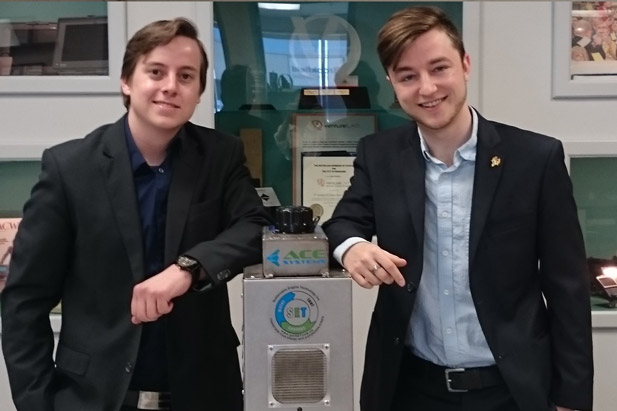UOIT student-entrepreneur proposes cleaner future for transportation industry
June 28, 2016

The transportation sector is one of Canada’s largest sources of greenhouse gas emissions (GHGs). According to a recent Environment Canada report on Canada’s emissions trends, transportation-related pollution in 2011 represented 24 per cent of the country’s overall GHGs. But with economic growth so closely tied to the availability and consumption of fossil fuel-based energy, switching to alternative fuels is a huge undertaking, and not likely to happen overnight.
What if there was a way to take the gasoline and diesel engines we have now, make them run cleaner and improve their fuel-burning efficiency?
University of Ontario Institute of Technology (UOIT) Energy Systems Engineering student Tom Ross has an answer. Ross teamed up with Joshua Eidelberg, a graduate of Algonquin College’s Electro-Mechanical Engineering Technician program in Ottawa, Ontario, to launch Sustainable Engine Technology (SET) Inc. The duo is bringing on-board (in-vehicle) hydrogen generation technology to market, dubbed the After Market Combustion Enhancement (ACE) System, which can make the thick, smoky emissions of trucks and buses a thing of the past.
How the ACE System works
The ACE System is an on-demand electrolysis system: it uses an electrical current to separate water into oxygen and hydrogen gas. Adding small amounts of hydrogen and oxygen gas to the diesel or gasoline used by vehicles’ engines improves combustion efficiency to get more energy out of the hydrocarbon fuel. The fuel burns more completely, resulting in a five to 20 per cent increase in fuel economy. Hydrogen and oxygen gas also help keep the engine cleaner. There is significantly less particulate matter (smoke) to obstruct filters and valves or contaminate the oil, which means less maintenance, longer-lasting oil and a longer engine life.
The ACE System has big environmental implications, especially for the transport trucking industry, one of the largest fuel consumers in the country. With an ACE System, existing trucks can continue to meet emissions standards for a longer time. The system can also make older (pre-1988) trucks meet current emission standards (one older truck emits the same levels of GHGs as 60 modern trucks).
The financial benefits are also evident. “For a transport truck driver who drives 15,000 kilometers a month or uses 5,000 liters of fuel, the ACE System will pay for itself in under a year-and-a-half, from just a 10 per cent increase in fuel economy,” explains Ross, SET’s President and Co-Founder.
SET’s entrepreneurial journey
Ross, a native of East Gwillimbury, Ontario, comes from an entrepreneurial family. The inspiration to enrol in the university’s Energy Systems Engineering program came after spending time working with his father developing onboard hydrogen generation technology. Ross has also taken some business courses to complement his Engineering studies.
But participation in the UOIT Brilliant Entrepreneurship 2015 Summer Incubator was what really put SET’s wheels in motion.
“The UOIT Brilliant Program played an integral part in helping us establish our business and strategies,” said Ross. “The mentorship and connections offered through the program also opened the doors to many more opportunities.”
For example, a $6,000 award from the university’s Firefly Entrepreneurship Fund in 2015 and an additional $5,000 in Firefly seed money this year enabled SET to establish a marketing strategy, launch a product trial, and land its first sale to Canes Community Care, a local transportation health-service provider. Canes purchased the ACE System with provincial funding through the Ontario Local Health Integration Network.
SET has been a finalist in multiple business pitch competitions, and received a scholarship for the President’s Club professional development program offered through Sandler Training, a Vancouver, British Columbia-based sales training company.
What’s next for SET?
Some exciting developments are in the works for the near term. SET has been granted product validation funding to further quantify combustion enhancement. The funding is coming from both the university’s Firefly fund, as well as a $32,500 grant from the Northumberland Community Futures Development Corporation’s N1M initiative.
SET is also working on plans to move out of its current research and development facility in Bradford, Ontario, and open a new purpose-built production facility in East Gwillimbury, Ontario.
About UOIT Brilliant Entrepreneurship
Brilliant Entrepreneurship is the University of Ontario Institute of Technology’s non-credit entrepreneurship program. Brilliant is supported in part by FastStart and Incubate, Innovate Network of Canada (I-INC). FastStart is a member of the ONE network and is funded in part by the Ontario Centres of Excellence. I-INC is supported in part by the National Research Council Canada.



